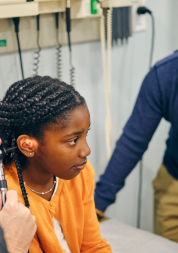Report: Investigating local health inequalities using the Core20PLUS5 approach

Findings
Access to appointments in GP practices is key:
- Many people give up trying to make an appointment as they say it is so difficult and too long a wait, reducing the opportunity for early diagnosis and timely intervention.
- People can feel judged or stigmatised during contact with their GP practice, e.g. when being triaged by a receptionist or care navigator.
- Communication challenges including not being listened to or being 'fobbed off'
There is evidence of people having a difficulty getting to places where health and care services are provided because there was no provision locally, because of public transport cutbacks, and discomfort at being in an unfamiliar setting.
Download the full report below.
Downloads
What is Core20PLUS5?
Core20PLUS5 is a national NHS England approach to inform action to reduce healthcare inequalities at both national and system level.
The King's Fund summarise Core20PLUS5 as:
- The ‘Core20’ – a focus on the 20 per cent of the population in the lowest deprivation quintile, which is meant to pick up and take on the overarching impact of deprivation on access, experience and outcomes.
- The ‘plus’ –an additional focus on local inequalities, determined by integrated care systems (ICSs), perhaps in an additional or intersecting population group (eg particular ethnic minority communities or inclusion health groups)
- The 5 – the five key clinical areas prioritised in the NHS long term plan, ie continuity of maternity care for women in the most deprived areas and those from Black, Asian and minority ethnic groups, annual health checks for those with serious mental illness, chronic obstructive pulmonary disease management (with a focus on Covid-19, flu and pneumonia vaccination uptake), early cancer diagnosis and hypertension case-finding.
"We’re grateful to Healthwatch for this report which gives us valuable information about how to better support our communities across BNSSG. It’s great to see some examples of where our services are working well to deliver care to people who need it."We also recognise there are areas for improvement. We are continuing to share learning between practices about what works well and are working to support practices to deliver high-quality services to patients."Practices are working hard to make sure everyone can access the right support when they need it, whether that’s online or face-to-face, and many practice reception teams have now had 'care navigator' training to help them guide people to the best care for their needs."The GP surgery team is growing and patients may be offered an appointment with a specialist such as an advanced nurse practitioner, physiotherapist, or clinical pharmacist. We’re also working with our community pharmacies, who are now able to see, advise and treat a number of minor illnesses."
Healthwatch found evidence of a combination of systemic barriers and failure to adequately accommodate individual access requirements, and these mainly accounted for individuals' difficulties in accessing healthcare
People we spoke to needed:
- Choice of means of access – in person, online, telephone that allows more flexibility for patients to explain their concern in the way they can best manage.
- A timely response to all patient-initiated contact
- More flexible triage systems
- Flexibility of appointment times and length with a mix of book-ahead appointments and on-the-day or within two days appointments
- GP practices working with their Patient Participation Groups or local communities to co-produce an appointment system that works better for their patients and the practice.
- Improved listening skills and training for receptionists to counteract stigma and subconscious prejudice.
- Improved funding for GP practices working in areas of high need to increase provision of appointments.
- Continued funding for tailored provision to marginalised communities.
- More opportunities for patient-controlled access, such as drop-in, with opportunistic screening.
About the authors
Julie has recently retired after 40 years in the NHS. She is now looking for new meaning and direction by using her time, enthusiasm and skills gained throughout my working life, previous volunteering, and own lived experience. Julie feels passionate about working with people in deprived communities and supporting inequality.
Cindy has been a rheumatology nurse specialist, practice nurse, research nurse and Relate counsellor and trainer. She completed her PhD at the University of Bristol in 2018, which was the evaluation of person-centred reviews for people with multiple long-term conditions in primary care. Cindy is a qualitative researcher specialising in complex healthcare interventions.

